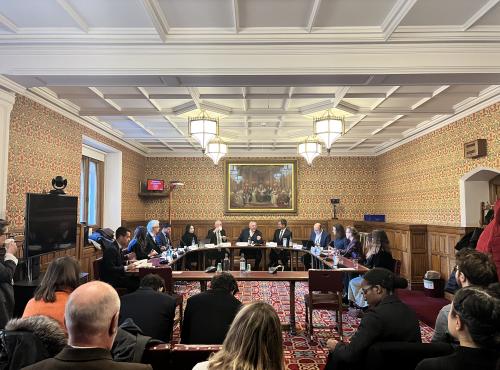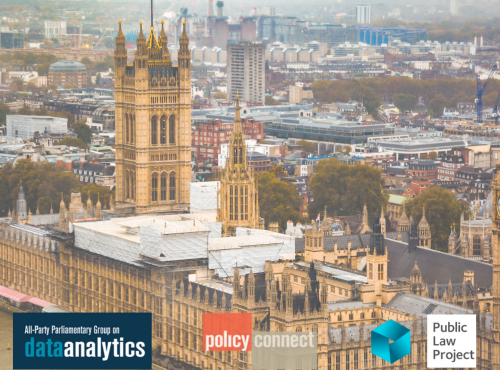An Ethical AI Future: Guardrails & Catalysts to make Artificial Intelligence a Force for Good
Parliamentarians set out proposals for the regulation of Artificial Intelligence to harness it as a force for good
Recent warnings from leaders and scientists have focussed the world’s attention on the amazing opportunities from Artificial Intelligence (AI) but also existing and potential future harms. Cross-party think tank Policy Connect’s report, ‘An Ethical AI Future: Guardrails & Catalysts to make Artificial Intelligence a Force for Good’, led by Daniel Zeichner MP, Lord Tim Clement-Jones and Lord Chris Holmes of Richmond, sets out how AI can be well regulated to deliver huge benefits to individuals and society now and in the future.
The inquiry was carried out as part of the All-Party Parliamentary Group on Data Analytics’ (APGDA) work. It reviewed the Government’s White Paper A pro-innovation approach to AI regulation and agreed the analysis of the risks and opportunities to the UK from new forms of AI. But harnessing the opportunities needs proper regulation and governance.
Contributors stressed that industry needs an unambiguous and responsive regulatory environment to foster growth and innovation. There was unanimity that the Government needs to move at scale and speed nationally; this will also help put the UK at the heart of international work.
The APGDA report sets out practical measures to achieve a supportive regulatory and governance environment that will embed the principles in the White Paper.
Building on good practice for good governance, the report calls for:
The Government to work with partners in Europe, the US and elsewhere towards a global AI Convention and Watchdog.
The creation of a National AI Centre to convene existing regulators, ensure agile regulation of AI, and fill any regulatory gaps.
The Government to introduce statutory duties worded such as to require organisations to achieve the objective of ‘doing no harm’ through ‘cultural embedding’ governance and leadership.
The National AI Centre for the UK would bring together existing AI ethics and research bodies and be properly resourced with strong powers to make things happen. The National AI Centre would build on current coordination work across regulators, to ensure there are no overlaps and gaps in regulation, and would carry out research to foresee future scenarios, so that the technical and policy guardrails can be adjusted to support innovation while protecting citizens against harm. It uses as its model the internationally renowned National Cyber Security Centre.
Policy Connect’s inquiry heard from industry leaders, academia, regulators, and civil society. All have contributed to developing policy proposals that will help the UK to reach its ambition of becoming a world leader in the ethical use of data and AI.
Daniel Zeichner MP, Inquiry Co-Chair:
“The All-Party Parliamentary Group on Data Analytics (APGDA), in its first report in 2019, described AI and data as our next major societal opportunity and challenge. Four years on, the APGDA continues to believe very strongly that the UK has a real opportunity to become a world leader in the ethical use of data and AI as a means of innovation in our lives and work. The purpose of this report is to set out how this can be achieved, including in relation to the critical role of Parliament.”
Lord Holmes of Richmond, Inquiry Co-Chair:
“Technology is developing at pace and the use cases are increasingly visible and impressive. But alongside this is a rising concern around safety and public trust which needs to be addressed if the UK is to build on our strengths and seize the opportunities. In our report we identify what kind of governance and regulatory ecosystem will help us to achieve maximum benefits from AI right now; manage current risks such as deep fakery; and also deal with big future risks as they become known. Our proposals represent a significant contribution to the Government’s consultation.”
Lord Clement-Jones, Inquiry Co-Chair:
“The Government’s White Paper is correct in its diagnosis of the risks and opportunities of AI. It rightly emphasises the need for public trust, and makes the case for central coordination. It even admits that this is what business has asked for. But the actual governance model it proposes falls far short of what’s needed. The APGDA’s report fills the gaps, setting out a comprehensive and practical set of regulatory and governance mechanisms. These will help the Government turn the principles in the White Paper into actionable regulation.”
Notes to Editors
The report’s author, Oona Muirhead CBE, would be happy to speak to the media. For further information contact Alainah Amer, Alainah.Amer [at] policyconnect.org.uk (Alainah[dot]Amer[at]policyconnect[dot]org[dot]uk).
About this Report
This is the third in a series of reports that Policy Connect has carried out on behalf of the All-Party Parliamentary Group on Data Analytics. The inquiry which produced this report was co-chaired by Daniel Zeichner MP, Lord Holmes of Richmond, Lord Clement-Jones. The inquiry received evidence from leading figures from parliament, industry, academia, and the third sector.
The inquiry was kindly sponsored by Bright Data, EY, Jisc, and Zurich Insurance.
This is not an official publication of the House of Commons or the House of Lords. It has not been approved by either Houses or its committees. All-Party Parliamentary Groups are informal groups of Members of both Houses with a common interest in particular issues. The views expressed in this report are those of the group.
About Policy Connect
Policy Connect is a cross-party think tank. We specialise in supporting parliamentary groups, forums and commissions, delivering impactful policy research and event programmes and bringing together parliamentarians and government in collaboration with academia, business and civil society to help shape public policy in Westminster and Whitehall, so as to improve people’s lives.
Our work focusses on five key policy areas which are: Education & Skills; Industry, Technology & Innovation; Sustainability; Health; and Assistive & Accessible Technology.
We are a social enterprise and are funded by a combination of regular annual membership subscriptions and time-limited sponsorships. We are proud to be a Disability Confident and London Living Wage employer, and a member of Social Enterprise UK.
About APGDA
The All-Party Parliamentary Group on Data Analytics (APGDA) is a cross-party group chaired by Daniel Zeichner MP, to connect Parliament with business, academia and civil society to promote better policy making on big data and data analytics.
The APPG on Data Analytics facilitates effective, productive communication and exchange between Parliament, Government, and the public, private and third sectors. To achieve this, Policy Connect delivers a programme of parliamentary roundtables and larger symposia, publishes reports and papers using the evidence from these sessions, and conducts direct government engagement to take forward the ideas form meetings and recommendations from reports.
The Group works with key figures from across government and regulators to engage with the development of good public policy outcomes. These include the Centre for Data Ethics and Innovation, the Information Commissioner’s Office, Ofcom, and the Bank of England.





